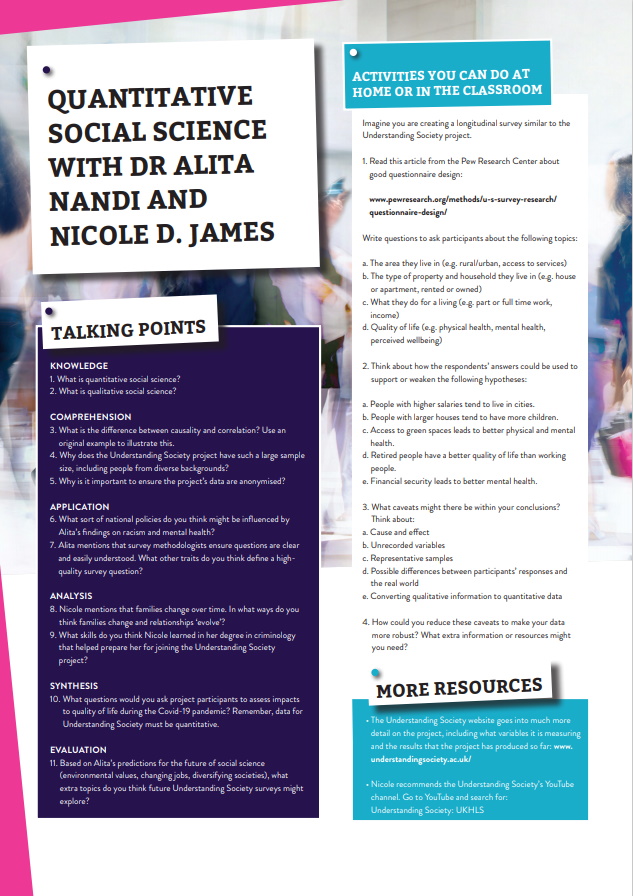How one massive study is uncovering the secrets of UK society
The Understanding Society project, run by the University of Essex in the UK, is a gigantic long term study that interviews households yearly to explore a huge array of life experiences. Dr Alita Nandi and Nicole D. James both work on the project, ensuring the substantial quantities of data collected can be used by researchers to shed light on societal trends within the UK
TALK LIKE A QUANTITATIVE SOCIAL SCIENTIST
CAUSALITY – when one variable has an effect on another
CORRELATION – when two variables appear to be connected but may be affected by another variable, rather than being linked
LONGITUDINAL STUDY – a study involving several observations of the same subjects over a period of time, sometimes many years
QUALITATIVE DATA – nonnumerical data that describes qualities or characteristics
QUANTITATIVE DATA – numerical data that can be statistically processed
What do you do for a living?
Did you go to university?
Do you exercise regularly?
Did you get bullied at school?
Are you happy?
These are some of the questions that the Understanding Society project asks of its participants every year. The project was set up by the Economic and Social Research Council in 2009 to regularly interview the members of 40,000 UK households from many different walks of life. By tracking how the members of these households change over time, researchers get a window into how lives change, and for what reasons. This is helping them track societal trends, and what they mean for well-being, equality and many other factors. Dr Alita Nandi and Nicole James work at the Institute for Social and Economic Research (ISER) at the University of Essex, in the UK, which is leading the project, to help ensure the data collected is used as effectively as possible.
“We interview the same set of people every year, so that we get a clear picture of their lives and how they are changing,” says Alita. “Researchers can use this information for all kinds of purposes – to see the similarities and differences in people’s lives, and whether these are controlled by people’s own actions and beliefs or rather by wider society. These answers can be used by voluntary organisations, activists, and policy makers to help them lobby for and implement policies for positive change.”
For instance, there is interest in the link between social media used by young people and levels of happiness. “Does increased use of social media make young people unhappy or do young people who are unhappy due to other issues – such as bullying – choose to spend more time connecting with likeminded people on social media?” says Alita. “It’s important to understand which is true, as it impacts how policies try to deal with the issue.” The Understanding Society project can help since it collects data every year – so, for instance, if researchers analysing the data find that individuals report being bullied before they report increased social media use, the second hypothesis is better supported.
DR ALITA NANDI
Dr Alita Nandi leads the Outreach team for Understanding Society. “Our team helps researchers understand how to use the data collected, through our user support forum and helpdesk, training workshops and online guidance,” she says. Setting up the questionnaire took some careful thought, especially due to its large size and duration. “We consulted with researchers, policy makers, voluntary organisations and the general public to find out what questions they wanted us to ask,” says Alita. “Then, we consulted survey methodologists, who have expertise in how to design questions that are clear and easily understood.” The questionnaires are also tailored so that respondents are only asked relevant questions – so unemployed people will not be asked about their salary, for instance.
Once the data is collected, it is anonymised and handed over to the data team. “The data team format the data so that they can be used by researchers for analysis,” says Alita. This analysis can lend important insights into how global events, like COVID-19, affect society. “We asked participants to complete short monthly questionnaires about their lives during the coronavirus pandemic,” says Alita. “Responses from November 2020 indicated that people from ethnic minority backgrounds would be less willing to take a vaccine if offered. This was presented to the government, who then launched a campaign encouraging uptake of the vaccine by ethnic minorities.”
INCENTIVE FOR CHANGE
This real-world impact helps motivate Alita. “Findings from my research have been presented to government departments, parliamentary select committees, and voluntary organisations,” she says. “While conclusions may sometimes seem obvious, having the data to back it up means that it is more likely to translate into action.” One project Alita works on involves examining ethnic minorities’ experiences with racism. “We found that around one in ten people from ethnic minorities in England have experienced a racially-motivated physical or verbal attack in the last year,” she says. “We also found these experiences negatively affect mental health.” Now that these statistics exist, there is added incentive for policy makers to do something about it.
NICOLE D. JAMES
Nicole got involved in the Understanding Society project when she joined as a Survey Data Officer in 2017, towards the end of her master’s degree. She now also uses the project’s data for her PhD research. “I work on data receipt and release, which involves various forms of data processing, quality checking and programming,” she says. “One of my main roles involves checking the data are consistent and ensuring any errors are investigated. I have automated parts of these processes, making it far more efficient, allowing us to increase the amount of checks we can do in an often short time period and focus on developing other parts of the survey process.”
FAMILY VALUES
Nicole also works on specific projects within Understanding Society, such as the family matrix project. “We collect relationship data from households, but households change over time so it can be difficult to track how these relationships evolve, especially when people move in and out of the household,” she says. “The family matrix project involves creating another dataset to pinpoint these relationships over time.” This will be very useful for researchers, such as those studying separated families and same-sex families.
“It’s important to undertake methodological survey research to see how we can improve the survey process and produce higher quality data,” says Nicole. “My PhD research focuses on nonresponse and panel attrition – the process where respondents drop out of the survey (temporarily or permanently). Surveys such as Understanding Society aim to represent the UK population, so as fewer people participate, the survey can become less representative and the findings from the data, less accurate. Attrition is an inevitable part of the survey process, so we want to understand when, how and why this happens to reduce it or account for it our analyses.”
 DR ALITA NANDI
DR ALITA NANDI
Senior Research Fellow & Associate, Director for Understanding Society, University of Essex, UK
RESEARCH INTERESTS: Ethnic & gender differences in economic and subjective wellbeing, including mental health; causes and consequences of discrimination and harassment.
NICOLE D. JAMES
PhD Student & Survey Data Officer for Understanding Society, Institute for Social and Economic Research, University of Essex, UK
RESEARCH INTERESTS: Nonresponse and panel attrition, data management and processing.
PhD FUNDER: University of Essex
Understanding Society is an initiative funded by the Economic and Social Research Council and various Government Departments, with scientific leadership by the Institute for Social and Economic Research, University of Essex, and survey delivery by NatCen Social Research, Kantar and Ipsos MORI. The research data are distributed by the UK Data Service.
Reference
https://doi.org/10.33424/FUTURUM151
TALK LIKE A QUANTITATIVE SOCIAL SCIENTIST
CAUSALITY – when one variable has an effect on another
CORRELATION – when two variables appear to be connected but may be affected by another variable, rather than being linked
LONGITUDINAL STUDY – a study involving several observations of the same subjects over a period of time, sometimes many years
QUALITATIVE DATA – nonnumerical data that describes qualities or characteristics
QUANTITATIVE DATA – numerical data that can be statistically processed
Did you go to university?
Do you exercise regularly?
Did you get bullied at school?
Are you happy?
These are some of the questions that the Understanding Society project asks of its participants every year. The project was set up by the Economic and Social Research Council in 2009 to regularly interview the members of 40,000 UK households from many different walks of life. By tracking how the members of these households change over time, researchers get a window into how lives change, and for what reasons. This is helping them track societal trends, and what they mean for well-being, equality and many other factors. Dr Alita Nandi and Nicole James work at the Institute for Social and Economic Research (ISER) at the University of Essex, in the UK, which is leading the project, to help ensure the data collected is used as effectively as possible.
“We interview the same set of people every year, so that we get a clear picture of their lives and how they are changing,” says Alita. “Researchers can use this information for all kinds of purposes – to see the similarities and differences in people’s lives, and whether these are controlled by people’s own actions and beliefs or rather by wider society. These answers can be used by voluntary organisations, activists, and policy makers to help them lobby for and implement policies for positive change.”
For instance, there is interest in the link between social media used by young people and levels of happiness. “Does increased use of social media make young people unhappy or do young people who are unhappy due to other issues – such as bullying – choose to spend more time connecting with likeminded people on social media?” says Alita. “It’s important to understand which is true, as it impacts how policies try to deal with the issue.” The Understanding Society project can help since it collects data every year – so, for instance, if researchers analysing the data find that individuals report being bullied before they report increased social media use, the second hypothesis is better supported.
DR ALITA NANDI
Dr Alita Nandi leads the Outreach team for Understanding Society. “Our team helps researchers understand how to use the data collected, through our user support forum and helpdesk, training workshops and online guidance,” she says. Setting up the questionnaire took some careful thought, especially due to its large size and duration. “We consulted with researchers, policy makers, voluntary organisations and the general public to find out what questions they wanted us to ask,” says Alita. “Then, we consulted survey methodologists, who have expertise in how to design questions that are clear and easily understood.” The questionnaires are also tailored so that respondents are only asked relevant questions – so unemployed people will not be asked about their salary, for instance.
Once the data is collected, it is anonymised and handed over to the data team. “The data team format the data so that they can be used by researchers for analysis,” says Alita. This analysis can lend important insights into how global events, like COVID-19, affect society. “We asked participants to complete short monthly questionnaires about their lives during the coronavirus pandemic,” says Alita. “Responses from November 2020 indicated that people from ethnic minority backgrounds would be less willing to take a vaccine if offered. This was presented to the government, who then launched a campaign encouraging uptake of the vaccine by ethnic minorities.”
INCENTIVE FOR CHANGE
This real-world impact helps motivate Alita. “Findings from my research have been presented to government departments, parliamentary select committees, and voluntary organisations,” she says. “While conclusions may sometimes seem obvious, having the data to back it up means that it is more likely to translate into action.” One project Alita works on involves examining ethnic minorities’ experiences with racism. “We found that around one in ten people from ethnic minorities in England have experienced a racially-motivated physical or verbal attack in the last year,” she says. “We also found these experiences negatively affect mental health.” Now that these statistics exist, there is added incentive for policy makers to do something about it.
NICOLE D. JAMES
Nicole got involved in the Understanding Society project when she joined as a Survey Data Officer in 2017, towards the end of her master’s degree. She now also uses the project’s data for her PhD research. “I work on data receipt and release, which involves various forms of data processing, quality checking and programming,” she says. “One of my main roles involves checking the data are consistent and ensuring any errors are investigated. I have automated parts of these processes, making it far more efficient, allowing us to increase the amount of checks we can do in an often short time period and focus on developing other parts of the survey process.”
FAMILY VALUES
Nicole also works on specific projects within Understanding Society, such as the family matrix project. “We collect relationship data from households, but households change over time so it can be difficult to track how these relationships evolve, especially when people move in and out of the household,” she says. “The family matrix project involves creating another dataset to pinpoint these relationships over time.” This will be very useful for researchers, such as those studying separated families and same-sex families.
“It’s important to undertake methodological survey research to see how we can improve the survey process and produce higher quality data,” says Nicole. “My PhD research focuses on nonresponse and panel attrition – the process where respondents drop out of the survey (temporarily or permanently). Surveys such as Understanding Society aim to represent the UK population, so as fewer people participate, the survey can become less representative and the findings from the data, less accurate. Attrition is an inevitable part of the survey process, so we want to understand when, how and why this happens to reduce it or account for it our analyses.”
 DR ALITA NANDI
DR ALITA NANDI
Senior Research Fellow & Associate, Director for Understanding Society, University of Essex, UK
RESEARCH INTERESTS: Ethnic & gender differences in economic and subjective wellbeing, including mental health; causes and consequences of discrimination and harassment.
NICOLE D. JAMES
PhD Student & Survey Data Officer for Understanding Society, Institute for Social and Economic Research, University of Essex, UK
RESEARCH INTERESTS: Nonresponse and panel attrition, data management and processing.
PhD FUNDER: University of Essex
Understanding Society is an initiative funded by the Economic and Social Research Council and various Government Departments, with scientific leadership by the Institute for Social and Economic Research, University of Essex, and survey delivery by NatCen Social Research, Kantar and Ipsos MORI. The research data are distributed by the UK Data Service.
ABOUT QUANTITATIVE SOCIAL SCIENCE
Quantitative social science is a field that uses statistics to uncover trends in society. This involves careful thinking about how fairly abstract terms – quality of life, beliefs and values, for instance – can be quantified into datasets. This is opposed to qualitative social science, which works with non-numerical data. Quantitative social science is more suited to dealing with large sample sizes and finding out trends in whole populations. “My work is very varied, which means I’m constantly learning,” says Nicole. “It was a steep learning curve when I first joined, but with time and the support of my colleagues, I now feel a lot more comfortable handling large amounts of data.”
Uncovering the root causes of patterns in society is a key focus for quantitative social science. “I enjoy finding out the causal link between events and behaviours,” says Alita. “For instance, why do some people get paid more than others – due to the value of their skills, or due to discrimination? Finding a causal link is the most difficult part of research but also the most rewarding.” Having hard data behind these causal links can spur positive action. “Though it’s a cliché, I enjoy knowing I’m contributing to something that will ultimately help improve society,” says Nicole.
As society changes, so too will social science. “Environmental concerns, in particular how to encourage positive behaviour at individual and institutional levels, are becoming increasingly relevant to us,” says Alita. “The nature of jobs and careers is rapidly changing too, which will open up new areas of research. For instance, does the gig economy offer more flexibility, or more job insecurity and poorer mental health? How does it impact decisions around family and housing? Societies are also becoming more multi-cultural and moving away from a binary gender heteronormative viewpoint. Institutions need to adapt to these changes, and social scientists can help make this happen.”
EXPLORE A CAREER IN QUANTITATIVE SOCIAL SCIENCE
• Many institutions offer outreach services for schools and students, to help them learn more about possible career paths in STEM. The University of Essex’s dedicated outreach team can be found here.
• Careers in quantitative social science vary widely. According to PayScale, UK graduates with a BSc in Sociology have an average salary of £30,600.
Alita and Nicole recommend statistics as a useful grounding, as well as sociology, economics and psychology, which all approach human behaviour from a different perspective. At university, many academic pathways can lead to a career in quantitative social science, including sociology, economics, psychology, computer science and data science.
ALITA’S TOP TIPS
01 Quantitative social scientists may follow very different career paths, but share a curiosity about human behaviour, a logical approach to solving problems and, often, a strong desire to make the world a more equitable place. If these drivers resonate with you, this could be the field for you.
02 It is not easy to know what career is best for you, especially when starting out. It is best to keep an open mind, gather as much information
NICOLE’S TOP TIPS
01 Don’t worry if you’re not sure what career to pursue. Speak to your teachers, who may suggest a career that you never knew existed.
02 Coding is an increasingly desirable skill. R and Python have a wide range of applications and are both worthwhile programming languages to begin learning before university.
HOW DID ALITA BECOME A QUANTITATIVE SOCIAL SCIENTIST?
WHAT WERE YOUR INTERESTS WHEN YOU WERE YOUNGER?
I grew up in India in a pre-internet world, so my connection to the rest of the world came through books and movies. I loved history, geography and mathematics, which gave me an insight into differences in society.
WHAT INSPIRED YOU TO BECOME A SCIENTIST?
At school, I took economics and, later, psychology, both of which dealt with human behaviour and how we make decisions. I remember learning about the difference between correlation and causality – how it was thought that coffee intake led to heart attacks, but, actually, coffee consumption and prevalence of heart attacks were both linked to high-stress jobs. I only decided on a career in research during my master’s.
WHAT ATTRIBUTES HAVE MADE YOU SUCCESSFUL AS A SCIENTIST?
My aptitude for mathematics, logical thinking and attention to detail have definitely helped – but, most of all, my curiosity about human behaviour.
WHAT HAVE BEEN THE EUREKA MOMENTS IN YOUR CAREER?
Through our research and analysis, we found that the cost to mental health of racial harassment was higher than the mental health cost of being unemployed. This helped to substantiate experiences I had gone through in my own personal life.
WHAT ARE YOUR PROUDEST CAREER ACHIEVEMENTS?
I come from a non-academic family and my relatives have all been very proud and supportive throughout my career. Every milestone, such as receiving my PhD, has been a wonderful moment to cherish with them.
HOW DID NICOLE BECOME A QUANTITATIVE SOCIAL SCIENTIST?
WHAT WERE YOUR INTERESTS WHEN YOU WERE YOUNGER?
I enjoyed cooking, reading, and watching TV shows and movies. In school, I loved maths and psychology, so it makes sense that I’m now involved in quantitative social science.
WHAT INSPIRED YOU TO BECOME A SCIENTIST?
I studied criminology initially, and in my final year found I enjoyed the quantitative side of sociology. Following advice from a lecturer, I then went on to study a Master’s in Survey Methods for Social Research, which focused on quantitative research in large-scale surveys like Understanding Society. After the first term, I realised that this was the field I wanted to be in.
WHAT ATTRIBUTES HAVE MADE YOU SUCCESSFUL AS A SCIENTIST?
Similar to Alita, logical thinking and attention to detail are key. It also helps to have good organisation and time management skills, especially when working on various parts of the survey process at once. Creative thinking and flexibility are very useful for writing code to manipulate the data and adapting to new software and processes as the survey advances.
WHAT ARE YOUR PROUDEST CAREER ACHIEVEMENTS?
I also come from a non-academic family, so completing my undergraduate degree and master’s degree were both great moments. Another achievement was becoming a Survey Data Officer at ISER, especially because it was my first ‘real’ job. More recently, securing a scholarship to fund my PhD has been a highlight. I am still very early in my career, so I’m looking forward to what comes next!
Do you have a question for Alita or Nicole?
Write it in the comments box below and Alita or Nicole will get back to you. (Remember, researchers are very busy people, so you may have to wait a few days.)















